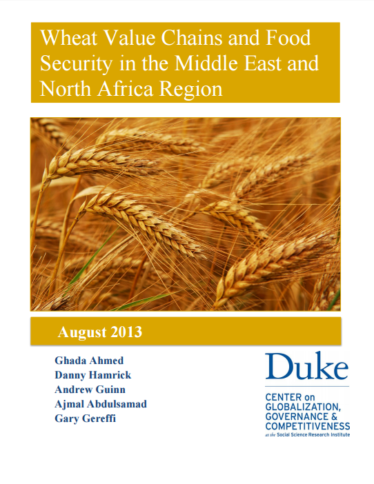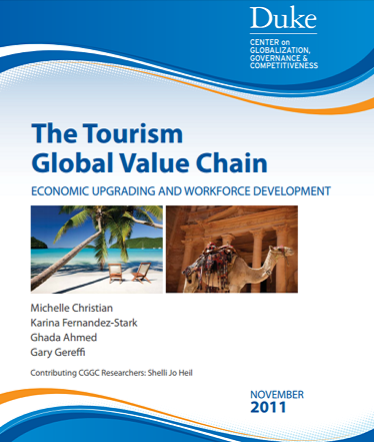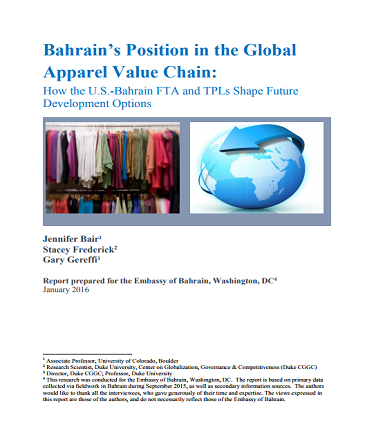For many countries in the Middle East and North Africa region, issues like food security, workforce development, trade policies and gender equality are key to improving competitiveness.
In terms of food security in the region, the rising costs of wheat contributed to the Arab Spring in Egypt and other countries. GVC Center studies on MENA countries’ wheat value chains and food security shed light on some of the underlying issues to instability in the region.
How can workforce development strategies enhance the upgrading efforts and competitiveness of developing countries in global industries? The Duke GVC Center offered insights to this question based on a study of the tourism GVC in Jordan.
Another study analyzed the impact of the tariff preference levels (TPLs) for apparel in the U.S. – Bahrain Free Trade Agreement over the past 10 years and provided policymakers with perspective on the prospects for the future of the industry in Bahrain if TPLs were not renewed after they are set to expire in July 2016; while a 2013 book entitled Global Value Chains, Economic Upgrading, and Gender includes a case study on the call center industry in Egypt and the relationships among upgrading, trade and gender.
IMPACT SUMMARY
Reports: 2
Publications: 10
Countries: 9 countries (Bahrain, Egypt, Iran, Jordan, Morocco, Saudi Arabia, Syria, Tunisia, and the United Arab Emirates)
Industries: Agrifood (wheat, maize), Services (tourism, call centers, employment), Manufacturing (apparel)
Sponsors: Minerva Research Initiative, RTI International, Embassy of Bahrain
CLIENT CASE STUDY
The Minerva Research Initiative was the primary sponsor of the Duke GVC Center’s research in the MENA region. Here is summary of the Minerva Research Initiative project.
Challenge: If future food price spikes last too long, social unrest in MENA could be exasperated, leading to regional conflict and widespread malnutrition and starvation. To help avoid such a scenario, the client wanted to understand the complexity of wheat markets and their underlying chain governance structure that determines food security outcomes in five MENA countries.
Approach & Outcomes: The interdependencies between global trade and local access to wheat and wheat products can be best understood through the GVC lens. Duke researchers used the GVC framework to first understand the industrial organization of the global wheat industry and then how the chain operates in Egypt, Iran, Saudi Arabia, Syria and the United Arab Emirates. Five key findings are as follows:
1. Five major firms dominate the global wheat industry in these markets.
2. The MENA region uses a variety of approaches to achieve food security.
3. Several issues, such as environmental distress and water shortages, cut across different country cases.
4. Institutional legacies are very strong in all five countries studied in this report.
5. The countries are diversifying their supply base.
As a follow-up, Duke GVC Center researchers studied the increasing role the Black Sea region (Russia and Ukraine) has on food trade into the MENA region. More information about the Duke GVC Center’s work in the Middle East can be found at the following link.


